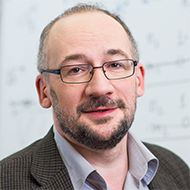- A
- A
- A
- ABC
- ABC
- ABC
- А
- А
- А
- А
- А
- HSE University
- Faculties
- Faculty of Computer Science
- School of Data Analysis and Artificial Intelligence
- News
- Basic Department ‘Mathematical Methods of System Analysis’ at the Institute for System Analysis of the Russian Academy of Sciences
-
The School
Pokrovsky boulevard, 11, room S938, Moscow, Russia, 109028
Phone: +7 (495) 772-95-90*27319
The School of Data Analysis and Artificial Intelligence was created in 2014 as part of the Department of Data Analysis and Artificial Intelligence. The school consists of world-renowned researchers who actively participate in international research projects.
Acquaye F. L., Kertesz-Farkas A., Stafford Noble W.
Journal of Proteome Research. 2023. Vol. 22. No. 2. P. 577-584.
Vasilii A. Gromov, Yury N. Beschastnov, Korney K. Tomashchuk.
PeerJ Computer Science. 2023. Vol. 9. No. .
Makhalova T., Kuznetsov S., Napoli A.
Data Mining and Knowledge Discovery. 2022. P. 108-145.
Dudyrev E., Semenkov Ilia, Kuznetsov S. et al.
Plos One. 2022. Vol. 17. No. 10.
Zhirayr Hayrapetyan, Nascimento S., Trevor F. et al.
In bk.: Information Systems and Technologies: WorldCIST 2022, Volume 2. Iss. 469. Springer, 2022. P. 141-147.
Dudyrev F., Neznanov A., Anisimova K.
In bk.: Artificial Intelligence in Education. Posters and Late Breaking Results, Workshops and Tutorials, Industry and Innovation Tracks, Practitioners’ and Doctoral Consortium -23rd International Conference, AIED 2022, Durham, UK, July 27–31, 2022, Proceedings, Part II. Springer, 2022. P. 436-439.
Egurnov D., Точилкин Д. С., Ignatov D. I.
In bk.: Complex Data Analytics with Formal Concept Analysis. Springer, 2022. P. 239-258.
Egurnov D., Ignatov D. I.
Automation and Remote Control. 2022. Vol. 83. No. 6. P. 894-902.
Kudriavtseva P., Kashkinov M., Kertész-Farkas A.
Journal of Proteome Research. 2021. Vol. 20. No. 10. P. 4708-4717.
Kanovich M., Kuznetsov S., Scedrov A.
Information and Computation. 2022. Vol. 287.

Basic Department ‘Mathematical Methods of System Analysis’ at the Institute for System Analysis of the Russian Academy of Sciences
The Institute for System Analysis (ISA) is a part of the RAS Department for Nanotechnologies and Information Technologies. The institute not only successfully solves basic and applied scientific problems of system analysis and information technologies, but also coordinates major scientific projects, and educates young scientists.
Scientific staff of the ISA unites competent and highly skilled specialists, including four RAS acting members, three RAS corresponding members, 50 Doctors and more than 100 Candidates of Sciences in Physics, Mathematics, Technology, Economics, Philosophy, Sociology, and Geography.
Among the major results of the ISA’s research work are the theory of control for uncertain nonlinear systems (Academician S.Emelianov); the macrosystem theory (Y.Popkov, RAS Corresponding Member); system modeling methods (Academician V.Gelovani); artificial intelligence methods for information behavior, search, and analysis modeling (G.Osipov, PhD in Physics and Mathematics); methods of symbol and audio object recognition, and database control (V.Arlazarov, RAS Corresponding Member); organizing methods of the distributed computing environment (A. Afanasiev, PhD in Physics and Mathematics); information security methods (D.Chereshkin, PhD in Technical Sciences); mathematical support and technologies for rapid construction of information systems, and automation of document processing; methodology for construction of bio-ecosystem simulation modeling, biomedical monitoring automated systems, and regional environment forecasting (S.Pegov, PhD in Technical Sciences; V.Krutko, PhD in Technical Sciences); efficiency theory and methods of investment projects evaluation (V.Livshits, PhD in Economics); methods of system diagnostics and regulation of spatially distributed organizational structures (V.Leksin, PhD in Economics; A.Shvetsov, PhD in Economics); theory basics and mechanisms of cross-sectoral social partnership (V. Jakimets, PhD in Social Sciences). The Institute’s applied research projects also enjoy a prominent place.
The establishment of the ISA Department at the HSE is another step towards partnership between the RAS Institute for System Analysis and the HSE. The Department will make the Faculty of Business Informatics and the School of Applied Mathematics and Information Science more attractive to potential students and postgraduate students, both Russian and international, who want to do applied research in system analysis, and applications.
The synergy of educational and research processes is essential for the education of future qualified specialists and researchers. The practice, implemented from the first higher education stages, has become traditional for the Moscow School of System Analysis. Maintaining and developing this tradition is an important objective for both the HSE, and the ISA RAS. Establishing the Basic Department ‘Mathematical Methods of System Analysis’, at the ISA RAS will contribute to this objective.
Y. Popkov, RAS Corresponding Member, is appointed Head of the Department. The lecturing staff include research fellows of the ISA, such as V.Arlazarov, RAS Corresponding Member; G.Osipov, Professor, PhD in Physics and Mathematics; V.Krivonozhko, Professor,PhD in Physics and Mathematics; N.Magnitsky, Professor, PhD in Physics and Mathematics; E.Orlova, Professor, PhD in Economics; B.Darhovsky, Professor, PhD in Physics and Mathematics; A.Bakushinsky, Professor, PhD in Physics and Mathematics.
Courses:
- Macro-system theory (Y.Popkov)
- Methods of big data system analysis and projection (V.Arlazarov)
- Artificial intelligence models and methods (G.Osipov)
- Techniques of corporation system optimization (V.Krivonozhko)
- Chaotic dynamics (N.Magnitsky)
- Information technologies of investment projects evaluation (E.Orlova)
- Methods of composite hypothesis testing (B. Darhovsky)
- Interactive methods of wrong problem solving, and optimization (A.Bakushinsky)
- About
- About
- Key Figures & Facts
- Sustainability at HSE University
- Faculties & Departments
- International Partnerships
- Faculty & Staff
- HSE Buildings
- HSE University for Persons with Disabilities
- Public Enquiries
- Studies
- Admissions
- Programme Catalogue
- Undergraduate
- Graduate
- Exchange Programmes
- Summer Schools
- Semester in Moscow
- Business Internship
- © HSE University 1993–2025 Contacts Copyright Privacy Policy Site Map
- Edit

